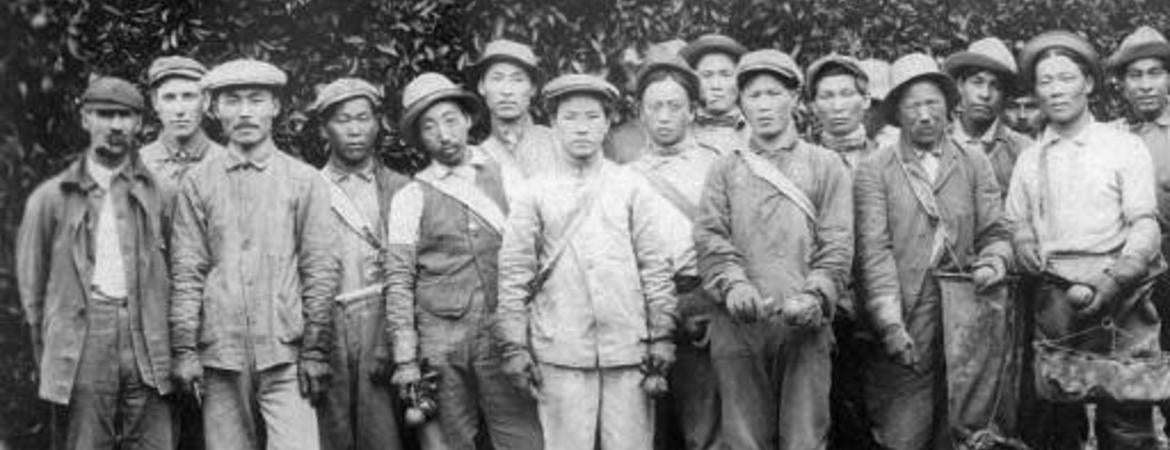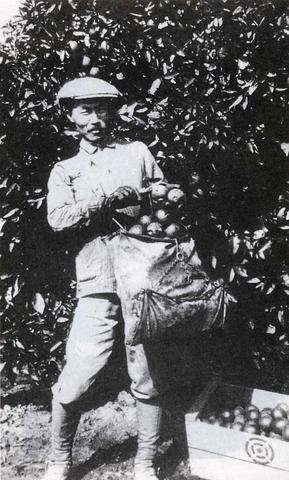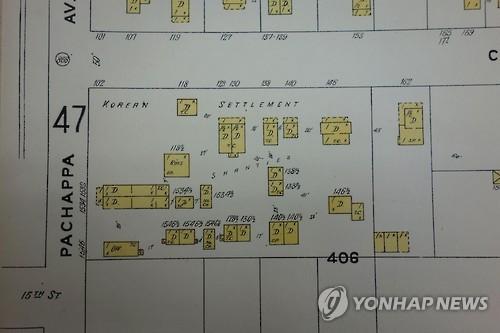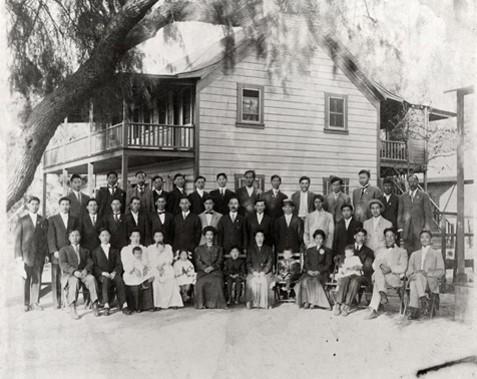
‘Uncovering the buried past of early Korean American history’ in Riverside
The book ‘Pachappa Camp: The First Koreatown in the United States’ was published this week by Professor Edward T. Chang
AUTHOR:SANDRA BALTAZAR MARTÍNEZ
April 27, 2021
Aslice of Korean American history that had been overlooked for more than a century is now officially a documented part of America’s citrus development in Riverside — and asserts that Korea’s democratic movement was also born here.
“Pachappa Camp: The First Koreatown in the United States” was published this week by Edward T. Chang, professor of ethnic studies and founding director of the Young Oak Kim Center for Korean American Studies at UC Riverside. The book chronicles Pachappa Camp in the early 1900s.
 Dosan Ahn Chang Ho orange picking in Riverside. Photo courtesy of the Korean American digital archive at USC.
Dosan Ahn Chang Ho orange picking in Riverside. Photo courtesy of the Korean American digital archive at USC.The camp was a small community where hundreds of Koreans lived in what is now known as Riverside’s Eastside, near 14th and Commerce streets. The community was established by one of Korea’s most influential independence activists, Dosan Ahn Chang Ho.
“Pachappa Camp was not only the first Koreatown in America but also the center of early Korean community and independence movement activities during the early 20th century,” Chang said. “This fills a void of modern Korean American and Korean history. Dosan Ahn Chang Ho is such a towering figure and yet we didn’t know about this. Pachappa Camp was the origins of the democratic origins in Korea.”
Pachappa Camp was initially known as Dosan’s Republic and was founded sometime in late 1904 or early 1905. Ahn lived in Riverside more than five years, between 1904-1907 and 1911-1913, then moved his family to Los Angeles in late 1913. Chang said most history books only include Ahn’s history from 1911 and forward.
While in Riverside, Ahn established the Cooperative Association, known as Gongnip Hyop Hoe, which Chang says led to the idea of establishing the New People’s Association in Korea. During the early 1900s Riverside was one of the wealthiest cities in California. Koreans came from San Francisco, Hawaii, and other parts of the country to work in the citrus groves and also found homes in what is now Redlands, Claremont, and Upland.
Pachappa Camp — the name comes from what was then named Pachappa Avenue — was a settlement in a segregated part of the city, with no electricity or running water. Year after year the population grew, drawing new residents every orange harvest season. Chang said Ahn always made sure workers took pride in their labor and took initiative in building a strong community.
 Pachappa Camp map. Photo courtesy of Sanborn Insurance Co. of New York.
Pachappa Camp map. Photo courtesy of Sanborn Insurance Co. of New York.The settlement thrived. Community members celebrated weddings, birthdays, Sunday services, held meetings, lectures, and fundraising activities. At some point the community had nearly 1,000 residents.
Among his accomplishments while in Riverside, Ahn created the Korean Labor Bureau; the Korean National Association of North America, Riverside chapter; the HeungSaDan or Young Korean Academy, an association he later founded in San Francisco in 1913 to develop leaders for an independent Korean; and in 1911 the Korean National Association of North America held its National Convention.
Ahn kept the community focused not only on prosperity, but also on supporting democratic changes in Korea. In the early 1900s Korean was ruled by kings, queens, and eventually came under Japanese rule in 1910.
“People tend to ignore Riverside or make it a footnote; but people should remember that Riverside was one of the most important historical sites of early Korean American history and pay tribute to our labor,” Chang said.
Knowing history is crucial to dismantling white supremacist ideology, he said.
On August 11, 2001 local Korean Americans gathered to erect the Dosan Ahn Chang Ho memorial statue in downtown Riverside. Pachappa Camp became a historic Korea Town formally recognized by the city on March 23, 2017.
“Pachappa Camp: The First Koreatown in the United States” was a project five years in the making. Chang researched English and Korean journals, newspapers, and made headway when two visiting Korean graduate interns majoring in Korean literature translated articles written in old Korean, to modern Korean language.
“Many of these primary source materials are newly discovered and shed new light on not only the formation of Pachappa Camp, but more importantly uncover the buried past of early Korean American history,” Chang said.
 Korean National Association of North America Convention in 1911. Photo courtesy of the Korean American digital archive at USC.
Korean National Association of North America Convention in 1911. Photo courtesy of the Korean American digital archive at USC.SANDRA BALTAZAR MARTINEZSenior Public Information Officer
Email (951) 827-2653
No comments:
Post a Comment